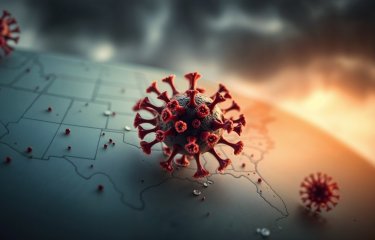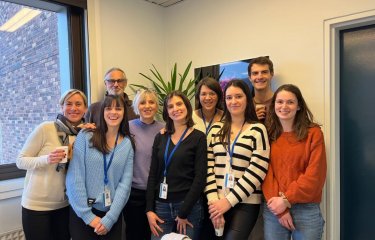It's hard to miss this pair on the Institut Pasteur campus in Paris. Obviously they're twins, but there's more to them than that. Even a brief encounter with these two characters gives a sense of their energy, curiosity and abundant optimism. Full of enthusiasm, they take turns to tell us about the unique journey that led to them completing their theses at the Institut Pasteur. These determined, passionate and tenacious women have overcome obstacles to achieve their dream of becoming scientists.
Showing determination
The girls jointly resolved to pursue a career in science when they were just 15 years old. Parisa, a passionate biologist, took the lead, with Sara, a keen mathematician and exact scientist, by her side. United, they left Tehran in pursuit of their dream.
Securing the best possible chances
Sara and Parisa were born into an educated family in Tehran. Their parents wanted the best for both of them. Academic achievement was of paramount importance to the family. The emphasis was not just on being good, but being the best. This was not about crushing the competition, but securing the best possible chances of achieving their goals and pursuing their chosen careers.
Sara and Parisa were among the top-scoring students in the competitive exam for university admission in Iran. They kept up the hard work at university, taking no holidays during the four years they were there! Instead, they enrolled in summer schools to improve their knowledge or completed laboratory internships.
This enabled them to pass a maximum number of modules and cover most life science topics. They also discovered and worked at a research lab at the Institut Pasteur in Iran, a member of the global Pasteur Network.

Parisa Khalilian, PhD, Membrane Trafficking and Pathogenesis unit
In the third year of our Bachelor's program, we decided to continue our studies at Paris Sorbonne University in France. We chose it for two reasons, firstly for its outstanding reputation and secondly because France wasn't too far from our parents.

Sara Khalilian, PhD, Cell Polarity, Migration and Cancer unit
In preparation for this, we had to learn French. We took classes at the French embassy in Tehran and private lessons during the final year of our Bachelor's program. Our mother tongue is Persian, we speak Arabic, and we're fluent in English, which we learnt from movies. We're also learning Italian!
Sara and Parisa can now speak four languages!
Never giving up
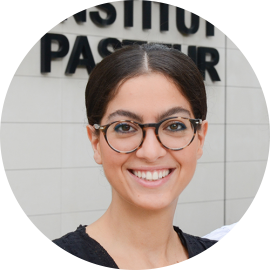
Sara Khalilian
Everything was very difficult when we arrived in France, but we knew we wanted to be where all the research was happening. To that end, we completed several research internships both in France and other countries. We applied to do our Master's at the Institut Pasteur, each in our own field of interest.
Having graduated with two Master's, one in Cell Biology, Stem Cells and Development and the other in Health Bioengineering, Sara joined the "Stem Cells and Development" Unit led by Professor Shahragim Tajbakhsh. This Laboratory of Excellence is funded by the "Investing in the Future" program. Stem cell research holds real promise in terms of new therapies, and procedures such as transplanting stem cells to repair damaged corneas in humans are already possible.
In particular, this laboratory is involved in research on Duchenne muscular dystrophy, a rare genetic disease that gradually leads to widespread muscle degeneration. Based on this research, it may one day also be possible to regenerate muscle cells in patients with genetic diseases. Having completed her second-year Master's degree, Sara was appointed to the position of research engineer. In this role, she played an active role in a team project and published a scientific article*.
Parisa works in the Membrane Traffic and Pathogenesis Unit led by Professor Chiara Zurzolo. She is researching tunneling nanotubes (TNTs), a fascinating topic that sheds light on the mysteries of intercellular communication.
Viruses and tumor cells are also transported by these nanotubes, enabling them to evade treatments and spread.
Remaining curious and open to others
The sisters are now completing their theses in buildings on opposite sides of the campus. However, they have kept up the habit of regularly discussing progress with their new work.
Sara and Parisa are a great source of support to one another. However, this does not mean that they are otherwise on their own.
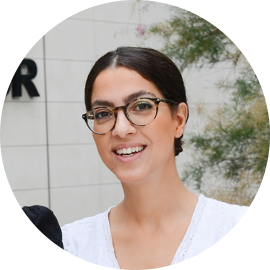
Parisa Khalilian
At the Institut Pasteur, there are lots of experts from a variety of disciplines, whether it be bioimaging or bioinformatics, for instance. This leads to some extremely enriching discussions that provide new knowledge enabling us to reassess our research from different angles using new techniques."
Gaining confidence and self-belief to benefit others
For her thesis, Sara wanted to work in the "Cell Polarity, Migration and Cancer" Unit led by Dr. Sandrine Etienne-Manneville.
SARA: "For me, cancer research was an obvious choice, as it's the biggest cause of death in France. In this unit, we conduct research on glioblastoma, a brain cancer that is the second most common type of pediatric cancer in France and the leading cause of cancer death in children. This type of cancer is extremely invasive and there are currently no therapeutic solutions available. My aim is to understand the molecular mechanisms that make these brain tumors so aggressive and incurable and the strategies they use to resist radiotherapy, one of the primary treatments for glioblastoma.
Working with Sandrine is very enriching from a scientific perspective, and I also find her inspiring as a person. Sandrine is open-minded and good at explaining things. She has always given me enthusiasm and unlimited motivation for performing my experiments. During my thesis, I have learned patience, organizational skills, independence and the freedom to work in my own way, trusting my own judgement."
Parisa continues to work with her supervisor, Stéphanie Lebreton in the unit where she completed her Master's.
Together, they are researching intracellular traffic of specific proteins, particularly those involved in breast cancer. Their aim is to understand the various mechanisms involved in cancer generation and development as well as strategies for preventing this traffic.
PARISA: "Stéphanie is a motivating scientist who has taught me to conduct research optimistically and confidently. She has enabled me to enjoy working on my research project. Chiara taught me to be tenacious when it comes to my passion, which is science. Now, whenever I'm certain I've got a good idea, I know I have to believe in it and prove its value through my results."
She has also worked on a project with a scientist in the Dynamic Regulation of Morphogenesis Unit led by Jérôme Gros. This work led to her publishing her first article *
In addition to the extensive scientific knowledge that Sara and Parisa have acquired during their career to date, they believe the demanding role of a scientist has shaped their outlook on life.
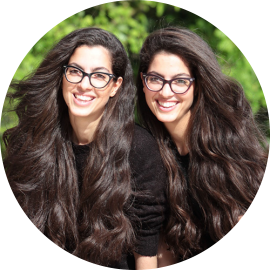
Parisa et Sara
The initial hypothesis for any research project must be rational.
In science, you need to be tenacious and experiment. Results don't come immediately, so you need to try, try again, make mistakes, reflect and explore new avenues.
You need to believe in yourself while also always remaining open to other people's qualities and skills!
Sara and Parisa now have one year left to complete their theses.
They feel at home in Louis Pasteur's country and have enjoyed exploring the various regions of France. This has enabled them to indulge in one of their real passions: discovering other cultures.
"We are really grateful for the journey we have been on in France. Our greatest wish is to continue our careers as scientists and contribute as much as possible to future progress."
Key dates in Sara's and Parisa's careers
Education:
Present: PhD student in cell biology and oncology, Institut Pasteur and Sorbonne University, Paris, France.
2020: Master's through the International Health Bioengineering Program, Université Paris Cité, PSL and Arts et Métiers Institute of Technology, Paris, France.
2019: Master's through the International Cell Biology, Developmental Biology and Stem Cell Biology Program, Sorbonne University, Paris, France.
2013: Bachelor's degree in cell and molecular biology, Tehran, Iran.
Career:
SARA
2020: Research assistant in the Cell Polarity, Migration and Cancer Unit led by Sandrine Etienne-Manneville, Department of Cell Biology and Infection, Institut Pasteur, Paris, France.
2019: Research engineer in the Developmental and Stem Cell Biology Unit led by Shahragim Tajbakhsh, Department of Developmental and Stem Cell Biology, Institut Pasteur, Paris, France.
Publication: Dynamics of Asymmetric and Symmetric Divisions of Muscle Stem Cells In Vivo and on Artificial Niches
2017: Research assistant in the Retinal Development and Repair Laboratory led by Olivier Goureau, Department of Development, Institut de la Vision, Paris, France.
2016: Research assistant in the Medical Biotechnology Laboratory led by Józef Dulak, Faculty of Biochemistry, Biophysics and Biotechnology, Jagiellonian University, Kraków, Poland.
2013: Research assistant in the Molecular Genetics and Cytogenetics Laboratory led by Masoud Garshasbi, Pars Hospital, Tehran, Iran.
PARISA
2020: Research assistant to Stéphanie Lebreton in the Membrane Traffic and Pathogenesis Unit led by Chiara Zurzolo, Department of Cell Biology and Infection, Institut Pasteur, Paris, France.
2019: Higher research technician in the Dynamic Regulation of Morphogenesis Unit led by Jérôme Gros, Department of Developmental and Stem Cell Biology, Institut Pasteur, Paris, France.
Publication: Mechanical feedback defines organizing centers to drive digit emergence
2018: Research assistant to Stéphanie Lebreton in the Membrane Traffic and Pathogenesis Unit led by Chiara Zurzolo, Department of Cell Biology and Infection, Institut Pasteur, Paris, France.
2017: Research assistant in the Gene Therapies and Animal Models for Neurodegenerative Diseases Laboratory led by Deniz Dalkara, Department of Therapeutics, Institut de la Vision, Paris, France.
2016: Research assistant in the Cell Biophysics Laboratory led by Jerzy Dobrucki, Faculty of Biochemistry, Biophysics and Biotechnology, Jagiellonian University, Kraków, Poland.
2013: Research assistant in the Molecular Genetics and Cytogenetics Laboratory led by Masoud Garshasbi, Pars Hospital, Tehran, Iran.



